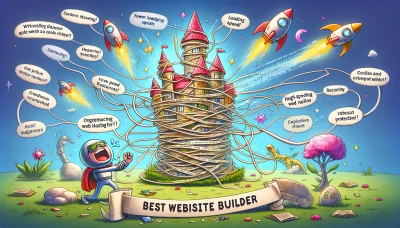Top website builder 2015 Quiz
Test Your Knowledge
Question of
Top Website Builders of 2015: A Look Back
In 2015, website builders emerged as pivotal tools for individuals and businesses alike, democratizing web design and enabling users to create and launch websites without the need for extensive coding knowledge. This era marked a significant transformation in the digital landscape, making it more accessible for entrepreneurs, creatives, and small businesses to establish an online presence. The importance of website builders during this period cannot be overstated, as they played a crucial role in leveling the playing field, allowing for greater digital participation and innovation across various sectors.
The Rise of Website Builders in 2015
In 2015, the digital landscape saw a significant surge in the use and popularity of website builders. This year marked a turning point where individuals and businesses alike began to favor these platforms for their ease of use, affordability, and the rapid deployment they offered. Website builders like Wix, Squarespace, and Weebly became household names, empowering users with little to no technical background to create professional-looking websites. This democratization of website creation led to a boom in online presence for small businesses, freelancers, and hobbyists, contributing to the vibrant and diverse internet we know today.
Top 5 Website Builders of 2015
- Wix: A user-friendly platform with a wide range of templates and design flexibility, making it a favorite for those looking to easily create beautiful websites.
- Squarespace: Known for its sleek designs and sophisticated templates, Squarespace is ideal for creatives wanting to showcase their work.
- Weebly: Offers a drag-and-drop interface that simplifies the process of website creation, catering to beginners and small businesses.
- Shopify: The go-to ecommerce website builder that provides everything a business needs to set up an online store and sell products.
- WordPress: Offers extensive customization through themes and plugins, making it a powerful platform for building a wide variety of websites.
Features to Look for in a Website Builder
In 2015, several key features made a website builder stand out among the rest. These included user-friendly drag-and-drop interfaces, which allowed users to create websites without any coding knowledge. Responsive design capabilities were also crucial, ensuring websites looked good on both desktop and mobile devices. Additionally, a variety of templates and customization options were important to cater to different styles and needs. SEO tools were also a must-have feature, helping websites to rank better in search engine results. Lastly, reliable customer support and affordable pricing plans were essential factors that users considered when choosing a website builder.
Comparing the Top Website Builders of 2015
| Website Builder | Features | Pricing | User-Friendliness |
|---|---|---|---|
| Wix | Drag-and-drop, Free templates | Free to $24.50/month | High |
| Squarespace | Beautiful templates, Full customization | $12 to $40/month | Medium |
| Weebly | Drag-and-drop, SEO tools | Free to $25/month | High |
| Shopify | E-commerce focus, Extensive apps | $29 to $299/month | Medium |
| WordPress.com | Customizable, SEO friendly | Free to $45/month | Varies |
The Impact of Website Builders on Web Hosting
The rise of website builders in 2015 marked a significant shift in the web hosting industry. Prior to this, creating a website typically required substantial technical knowledge, including understanding of HTML, CSS, and sometimes even JavaScript. This barrier to entry limited website creation to those with the necessary skills or resources to hire a developer. However, the emergence of user-friendly website builders democratized the process, enabling individuals and small businesses to create their own websites without any coding knowledge. This shift led to an increased demand for web hosting services that could seamlessly integrate with these builders, pushing traditional web hosting companies to evolve. They began offering more comprehensive packages that included access to website builders, domain registration, and email hosting in a single plan. This evolution has not only made web hosting more accessible to a broader audience but also intensified competition among hosting providers, leading to better services and more competitive pricing for consumers.
Looking Forward: The Future of Website Builders
Reflecting on the trends observed in 2015, it's clear that the future of website builders is poised for significant evolution. During that time, we saw a surge in the demand for more intuitive, drag-and-drop interfaces that cater to users without coding expertise. This trend is likely to continue, pushing developers to create even more user-friendly platforms that offer advanced functionalities without the need for complex coding. Moreover, the rise of mobile browsing around 2015 has underscored the necessity for website builders to prioritize responsive design, ensuring websites automatically adjust to look great on any device. We can also anticipate further integration of AI and machine learning technologies to streamline the web design process, offering personalized design suggestions and automating tasks to enhance efficiency. As a result, the future of website builders will not only make web design more accessible to a broader audience but also empower users with tools to create more dynamic, interactive, and visually appealing websites with ease.












